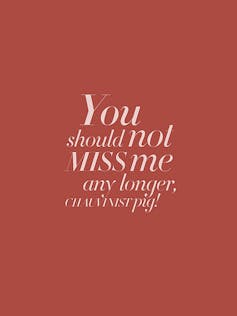Alongside sketchy rationales like postponing the whole rat race thing, a pivotal reason that I got my PhD was to avoid the Miss/Ms conundrum. As first world a problem as is imaginable, but it plagued me: the mouth feel of Miss was the preference, but there was something a little pukey about using it post-25.
Doctor is simpler. There’s gender neutrality. I like that it gives no hints - subtle or implied - to my marital status, sexuality or political affiliations. I like that, all going well, this will be the title I get to use for the lion’s share of my life.
In France in recent days, _mademoiselle _- the French word for Miss - has been stricken from government forms. Pretty soon that ever so glamorous sounding salutation will no longer be a choice on official paperwork.
In a move that’s delighted a host of feminists, apparently this decision signals yet another bastion of inequality quashed. (At least it will once the old forms are used up!)
Appalled at this decision, however, are those sticklers for tradition. Those French who have long been vigorously defending their language from the encroach of English advertising, English music and English on billboards are outraged.
As one French philosopher histrionically lamented, “There are more English words on the walls of Paris than German words under the (Nazi) Occupation”.
Even without blind passion about thwarting cultural imperialism are women who simply want to pick their own title. They want the sassiness, the sexiness but most of all they want the choice.
While framed as a gender equity issue, lost in this debate is that this isn’t an issue with feminist consensus.

Like the different feminist camps sparring over abortion, sex work and cosmetic surgery, highlighted in the title debate is the very complicated - and politicised - notion of choice.
At the heart of liberal feminism is individual autonomy. The choice whether to marry, whether to do femininity, whether to have children, whether to use a title that quite possibly fetishises availability.
In the radical feminist camp are those wanting to take the option of selecting one’s oppression out of circulation. Apparently women won’t make the “right” decision themselves: cue social engineering and option elimination.
I’m conflicted. Had I not gotten my PhD, I’d likely be using Miss, having convinced myself that it sounds just slightly less spinsterish than Ms. Had _Mademoiselle _been an option, I would have chosen it for its theatricality.
But my feminism is of the “bigger fish to fry” ilk. I have scant interest in wanting to rename manhole covers, to use politicised spellings like womyn and grrls or to kick down “men working overhead” signs.
That said, there is also something fantastically symbolic about the French government’s move. A small gesture sure, but a step towards a bureaucratic level playing field nevertheless.
While I’m not convinced that advancing the political agenda of some feminists at the sacrifice of the choices of others is progress, the symbol of removing lifestyle choice disclosure from paperwork is a good one.
After all, there are very few times a government needs to know what a woman gets up to in her own bed.

